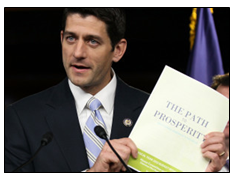 |
April 25th, 2011 There is a supply problem, but it's not with oil. The President has not filled 12 government watchdog Inspectors General slots since taking office in January of 2009. The Ryan Plan sees the empowerment of patients as consumers as the, "critical element in restraining the growth of health costs without government rationing." Paul Ryan's budget embraces a fatal premise of the Nanny State. Obama's Pain at the Pump Once again, oil and gasoline prices are on the march upwards, and conveniently,Barack Obama is waving the "speculators" card, promising to investigate nefarious investors he alleges are behind it all. With average gasoline per gallon prices nationally at over $3.80 and rising rapidly, American motorists are taking note of the increases — and are asking why they're paying more. "[A] lot of what's driving oil prices up right now is not the lack of supply. There's enough supply. There's enough oil out there for world demand," Obama said. Pretty much, that part is true. Since 2009, global oil consumption has increased from 84.133 million barrels a day to 86.7 million in 2010, a 3 percent increase, according to the Energy Information Agency (EIA). Furthermore, the EIA projects a further consumption increase of 1.5 million barrels a day in 2011, bringing the total consumption rise from 2009 to 2011 to a total 4.8 percent increase. Get full story here. 12 Missing IG's Are In The Team Obama Spotlight Video by Frank McCaffrey Get permalink here. Would Ryan's Plan Cut Benefits to Seniors? By Victor Morawski  We showed last week how the proposed Ryan budget plan intends to save the Federal Government money on its Medicare costs and lower the deficit by changing the program from a single-payer to a premium-support plan and allowing open interstate competition among health insurers — something now forbidden — to keep premium costs down. But not everyone agrees. Editors of The Nation, for instance, say of Ryan, "the savings he projects would come less from competition than from simple cutbacks to care and benefits." A similar sentiment is echoed by writers at msnbc.com when they observe that Ryan plan supporters must view voters under 55 as being, "more alarmed about the national debt than they are about cuts in future benefits." Charges like the above will no doubt alarm younger readers who will figure that if it is enacted then they would not fare as well in their golden years as current Medicare recipients. That this cause for alarm at the Ryan plan is baseless can be seen clearly if we simply ask ourselves, "What would it mean to say that the Ryan plan cuts care or future benefits to seniors?" His proposal changes the Medicare program from one that pays health care providers directly for their services to one which effectively pays premiums for seniors to purchase health insurance in the private marketplace (with some means testing involved). Get full story here.  ALG Editor's Note: In the following featured column from Reason Magazine, Shikha Dalmia makes the case against House Budget Chairman Paul Ryan's plans to reform Medicare in the 2012 budget:  Why RyanCare Will Fail By Shikha Dalmia President Obama last week criticized the Medicare vouchers that are part of RyanCare, the health care reform plan in the budget proposal by Rep. Paul Ryan, R-Wis., because they would allegedly balance the budget on the backs of seniors. But his fellow liberals have been criticizing vouchers for the opposite reason: They will cost too much and won't control Medicare spending. They are right. However, the reason is not GOP economics, but liberal politics that Rep. Ryan has bowed to. The basic idea behind Ryan's reform is simple: Medicare, the government-funded health care program for seniors, is a slowly tightening noose around this country's fiscal neck. Health care costs have been growing at twice the rate of the economy. But seniors have little incentive to curb their medical consumption because they don't pay for it—taxpayers do. Indeed, according to the president's Council of Economic Advisers, 30 percent of Medicare spending produces no medical benefits. Get permalink here. |
*****
Kevin Dayhoff Soundtrack: http://kevindayhoff.blogspot.com/ = http://www.kevindayhoff.net/ Kevin Dayhoff Art: http://kevindayhoffart.blogspot.com/ or http://kevindayhoffart.com/ = http://www.kevindayhoff.com/ Kevin Dayhoff Westminster: http://kevindayhoffwestgov-net.blogspot.com/ or http://www.westgov.net/ = www.kevindayhoff.org Twitter: https://twitter.com/kevindayhoff Twitpic: http://twitpic.com/photos/kevindayhoff Kevin Dayhoff's The New Bedford Herald: http://kbetrue.livejournal.com/ = www.newbedfordherald.net Explore Carroll: www.explorecarroll.com The Tentacle: www.thetentacle.com



No comments:
Post a Comment
Note: Only a member of this blog may post a comment.